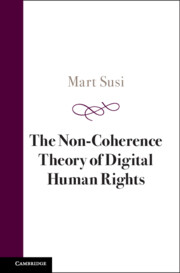Book contents
- The Non-coherence Theory of Digital Human Rights
- The Non-coherence Theory of Digital Human Rights
- Copyright page
- Contents
- Acknowledgements
- Introduction
- Part I The Contextual Challenges and Purpose of the Non-coherence Theory of Digital Human Rights
- Part II Reflections on Some Theories and Doctrines
- Part III The Core Elements of Non-coherence Theory
- Part IV The Impact of the Non-coherence Theory
- 18 The E-state and Fundamental Rights
- 19 Proportionality Deficit Paradox
- 20 Automated Systems and Artificial Intelligence
- Part V Internet Balancing Formula
- In Lieu of the Concluding Remarks
- Index
20 - Automated Systems and Artificial Intelligence
from Part IV - The Impact of the Non-coherence Theory
Published online by Cambridge University Press: 22 February 2024
- The Non-coherence Theory of Digital Human Rights
- The Non-coherence Theory of Digital Human Rights
- Copyright page
- Contents
- Acknowledgements
- Introduction
- Part I The Contextual Challenges and Purpose of the Non-coherence Theory of Digital Human Rights
- Part II Reflections on Some Theories and Doctrines
- Part III The Core Elements of Non-coherence Theory
- Part IV The Impact of the Non-coherence Theory
- 18 The E-state and Fundamental Rights
- 19 Proportionality Deficit Paradox
- 20 Automated Systems and Artificial Intelligence
- Part V Internet Balancing Formula
- In Lieu of the Concluding Remarks
- Index
Summary
There are two human rights properties overshadowing academic discourse and policy documents in relation to automated systems and artificial intelligence which are operating in the digital realm. These properties are about the trust in artificial intelligence and automated systems, and secondly, of robustness. The latter appears in two aspects related to law governing the AI solutions and the AI itself. The degree of our trust in physical judges is related to our expectation that they are capable of distrusting the law. And our trust in automated systems and artificial intelligence is weaker because we assume that they completely trust the law. It could be said that we cannot find a better positivist than artificial intelligence. The moment artificial intelligence can independently exercise disavowal and intolerability formulas, that is, articulate a reasoned understanding that a specific legal norm or rule is profoundly unfair, then the non-coherence disappears. However, then we would no longer be dealing with artificial intelligence; perhaps we could term such a decision-maker an artificial brain.
Keywords
- Type
- Chapter
- Information
- The Non-Coherence Theory of Digital Human Rights , pp. 232 - 246Publisher: Cambridge University PressPrint publication year: 2024



